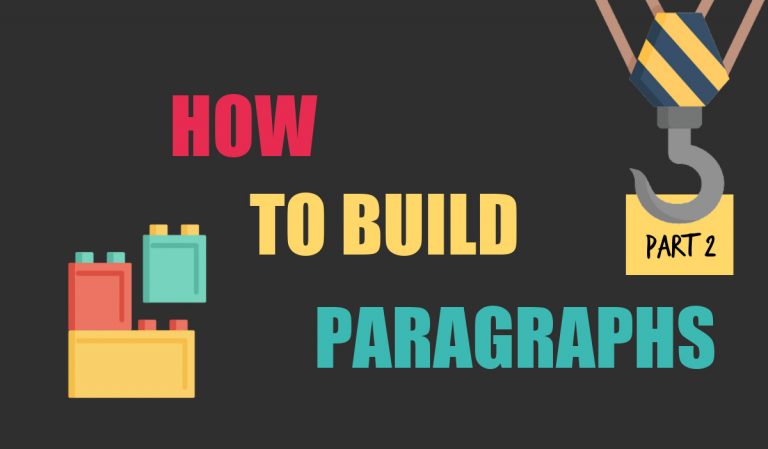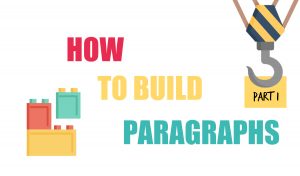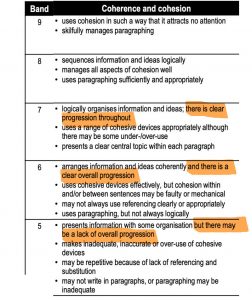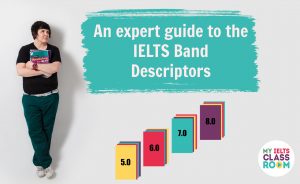
IELTS paragraph writing: Part 2
Last week, we looked at the basics of IELTS paragraph writing. We discussed what paragraphs are and the importance of unity. We also took a deep-dive into how you can write a paragraph that contains two ideas. If you have not listened to that episode yet, I strongly recommend that you go back and complete it before progressing onto this one.

Below, you can find a summary of the episode, which includes all of the links to useful materials and the times of each part of the discussion (so you can go directly to the part you want to listen to) 🚀
- Subscribe to My IELTS Classroom podcast on Apple podcasts here
- Subscribe to My IELTS Classroom on Google podcasts here
- Become a Patreon to gain access to extra BONUS episodes here

IELTS Paragraph Writing: The basic building blocks
The most boring part of my job is trying to find a key word for my blog posts each week. This is the word or phrase that students Google when they are looking for information and will help them to find my lessons. Every time I look for key words, I am always depressed that the number one phrase on Google is “IELTS essay templates”. Honestly nothing makes me feel more sad than this group of words.
Why? Well, “IELTS essay templates” simply do not exist. Sure, for very low-level students, or very young students, you can provide them with a 4 sentence plan that may help them to achieve a 5.0 for Task Response, but the truth is that every IELTS paragraph is unique and will, therefore, have its own unique structure. Sure, you will start with a topic sentence, but how you move from there will depend on your argument and how you intend to justify or prove it.
Think of IELTS paragraphs like snowflakes – they may look similar but no two are the same!

However, just because there is no one template that can possibly cover the development of every paragraph, that does not mean that there are no tools you can use to build them. In fact, the language of essays is fairly predictable. If you look at any well-written paragraph, you will find that it contains more or less the same “blocks” of English. In other words, every sentence will perform one of the following functions:
- Topic sentence (the only block you MUST have)
- Explanation
- Reason
- Comparison
- Result
- Example
- Balance
If you are able to write these simple blocks, you can combine them to build a coherent argument for any agree / disagree essay.
Before we continue, let me make a couple of points very clear.
- You do not have to use all of the blocks in every paragraph (in fact, aiming to do so would be a bad idea as your paragraph would be too long).
- You can use a block more than once in the same paragraph (in fact, this is natural, especially for the explanation block).
- Some blocks may form more than one sentence (in fact, for higher level students, spreading a block over two sentences can be a great way to show high-level cohesion)
- Two more more blocks may appear in the same sentence (in fact, some sentences may perform more than one function, such as when you offer an example to explain your argument further)
My point is simply that these are the tools you will need to build and extend your ideas. You can use them in any combination in your IELTS paragraph writing as long as your paragraph has progression.
IELTS Paragraph Writing: The importance of progression
The IELTS band descriptors are presented in a specific order, with the most important category in each section placed first in each band. If we look at the band descriptors for Coherence and Cohesion, you can see that this is where “progression” is placed:

However, the concept of progression is not always clear to students. What does it mean to write an essay that “progresses”? Well, very simply it means that every sentence in your essay should move your argument forward in a way that is relevant. Part of this is making sure that your paragraph has unity (as we discussed last week), but it is also equally important that each of your sentences adds something new to the discussion.
In other words, if a sentence is not connected to the main argument or is repeating what you have already previously said, then you do not have progression.
A simple way to check if your paragraph has flow is to ask yourself the following questions as you write:
- Why am I giving this information?
- Is it relevant?
- How does it develop my argument further?
Remember, every sentence in a paragraph should add something new in a paragraph and move it forward in some way. If you are doing this, you will have progression!
Want to know how the examiner will apply the band descriptors when marking your IELTS essay?
Then download a copy of our FREE e-book, which explains how each of the four marking criteria is applied and includes the most common errors made by test-takers. Just click here for your copy.

IELTS Paragraph Writing: Writing Paragraphs with One Main idea
Progression is usually not a big problem in paragraphs that discuss two main ideas, as students have so little space to develop each idea that they rarely go off-topic. However, when there is just one idea in a paragraph, it is very common for students to write information that is redundant or repetitive. In particular, students tend to start paragraphs strongly with a clear topic sentence and follow-up explanation sentence, but then veer off-topic in the middle.
If this is happening to you, then you should take some time to learn how to write paragraphs that progress. The easiest way to do this is to plan how you will develop your argument before you start writing. Think of your paragraph like a river that should flow logically from start to finish. Having the main idea is just the start. What you should do is think carefully about how you are going to build your argument in each sentence. Ask yourself “what information do I need to give next in order to convince the examiner of my position?”. Or, in other words
Which block can I give next to make my position 100% clear?
As I said before, there is no correct way to develop a paragraph. All you should focus on are the steps that you will take from giving your argument in the first sentence to ending it in the last. Don’t write the paragraph, just plan the steps.

Let me show you what I mean. A couple of weeks ago, Nick and I brainstormed ideas for this recently reported IELTS essay question:
Governments should give a basic income every to citizen, whether they are employed or not, so that they have enough money to live on. To what extent do you agree or disagree?
In that lesson, Nick came up with a brilliant argument for students who wanted to disagree. He said that the extra money that people receive would very quickly become worthless as prices would simply rise in response. If I were to plan the steps of this argument, I would come up with the following five blocks:
- Topic Sentence – the extra money would only help citizens in the short-term
- Explain: The extra money will be useful at the start – maybe give example of how people can spend this money.
- Result: If people have more disposable income, prices will naturally rise in response.
- Example: People will be able to afford a better apartment, but demand will outpace supply, so prices will rise
- Result: Even though people have more money in their pocket, they won’t actually have a higher standard of living in the long run
Again, this is just one way that you could develop this paragraph. I am sure if you gave this topic sentence to 100 IELTS teachers, they would each come up with a different answer. However, the point is simply to show you how planning your “blocks” ensure that you have a paragraph that “flows”. Here, every sentence 100% addresses the question, follows from the one before, and adds something new to make the argument clearer. In other words, this paragraph will definitely have progression.
Why not try doing this yourself now? Find an agree / disagree question and plan how you would develop your argument. You don’t have to give your blocks names (as it can be hard to decide if something is an explanation or a reason!) – just make sure you know which sentences you will write in which order.
New to IELTS? Find out how IELTS essays are very different to the academic essays that you are asked to write at school or university here.
IELTS Paragraph Writing: Three tips to help plan your arguments better
I understand that for many students, having the logic to develop paragraphs can be difficult, so here are three simple ideas to help you:
1. Keep looking back at the topic sentence as your plan to make sure that you are on-topic.
When you write a chain of sentences, it can be easy to move in the wrong direction. One simple way to fix this is to keep looking back at your topic sentence as you plan. Remember, everything you write in your paragraph should support and justify the argument that you have made there.
2. Imagine that you are explaining your argument to a friend
Good arguments are clear and easy to understand. I think it can be helpful to imagine that you are explaining your argument to a friend. Try to explain your argument in such a way that your friend will understand it completely, and agree with you (after all, good arguments are persuasive!) Think about the order that you will need to present the information to your friend for them to follow your argument easily.
Are there any examples that you can give to either make your argument clearer or more persuasive to your friend? How would you round off your “presentation” of your argument? These are all things that I think about when I structure my paragraphs to make sure that they flow. Why? Because I am always thinking about who will read my paragraph when it is finished!
3. Use natural language when you plan (and write) your paragraph
The second reason that imagining explaining your idea to a friend can work is that usually when we speak to friends and family, we speak in plain English. So much of the time, students ruin their arguments by trying to use vocabulary and lexis that is just not suitable. Why? Because they want to sound “academic”.
Sadly, this it is not their fault. For too long, poor online resources have told students that they need to modify their language to achieve a high score. This is simply not true. The best essays are clear and simple to read. Sure, they will contain some high-level grammar structures and lexis, but those will be used naturally, and be “hidden” inside the argument.
Too many students try to “force” what they think are “high-level” structures into their paragraphs. Rather than trying to think how they can best express their ideas, they focus only on trying to show what they think is their best language (although sadly it often isn’t). By doing this, their arguments sound superficial at best, lose all meaning at worst.
If I could give only one piece of advice to every IELTS test-taker, it would be focus on your argument first and your language second.
After all, think about what an agree / disagree essay is – it is an essay where you are trying to tell somebody your OPINION. The language that you choose should always be the best language to make your argument in the clearest most concise way. Trust me, if you just focus on explaining and justifying your ideas, the good language will naturally follow.
IELTS Paragraph Writing: Natural grammar for each block
However, what is natural language for giving and justifying your ideas? Well, again, there are no rules, but there are definitely certain structures that are naturally used to express each function. Again, you should not try to “force” any of these into your essays, but you can use them to express your arguments clearly and precisely.
Explain
Cause / Effect language (mean / result in / lead to / allow) BE CAREFUL OF THE LANGUAGE HERE
- The extra money could be useful at the start as it would mean that everybody would be able to afford basic goods such as food and rent or have the extra income to splash out on luxury goods like electronics.
- The extra money could lead to equality in the short-term as all citizens could afford basic goods.
Result
1st / 2nd conditional:
- If people have more disposable income, prices will naturally rise.
- If people limited their social media use to one hour a day, they would stop comparing themselves needlessly to other people.
The + comparative, the + comparative
- The more disposable income people have, the more prices will rise
Result relative clause
- If people have more money in their pocket, they would naturally spend more, which would naturally result in prices rising.
Reason
This is because……
- This is because not every citizen needs financial help to afford the cost of living
As / because / since
- There is simply no need to give everybody a basic wage as not every student needs financial help to afford the cost of living.
Given that + reason
- Given that many people can cover the cost of living easily on their own, there is simply no need to give everybody a basic wage
Compare
Comparison adjectives (better / bigger / faster – make sure you use them with “than”)
- A better solution would be to give a living wage only to those who are financially insecure
Contrast subordinators (while / whereas)
- While giving every citizen a universal income would increase the population’s standard of living in the short-term, targetting only those citizens who require help would be more beneficial in the long-term.
Unlike X,
- Unlike universal benefits, giving extra to only those who require support would be cheaper and more effective.

Balance
Contrast – concession (while / whereas / although)
- Although it could be argued that having a fixed income each month would increase people’s standard of living, I feel that this would only happen in the short-term.
Contrast – concession (despite / in spite of)
- Despite the fact that having a fixed income each month would increase people’s standard of living initially, I feel that this would only happen in the short-term.
Example
Examples are usually introduced with a transition signal or a phrase (Take X for example / For instance / A good illustration of this is X)
- Take renting for example, with the extra income, many will be able to afford to rent a better apartment, but as demand for houses and flats increases, so will the price.

